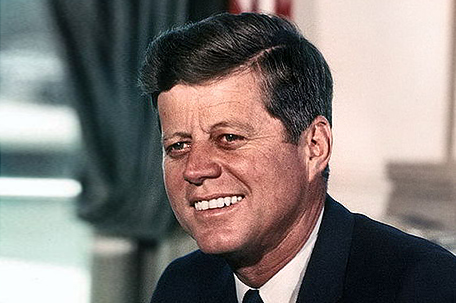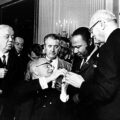
ABOVE PHOTO: President John F. Kennedy
(Photo credit: White House)
By Earl Ofari Hutchinson
There’s been as much myth as fact regarding John F. Kennedy’s civil rights legacy in the more than 50 years before, during and especially after his assassination on November 22, 1963. In the days before he delivered his now famed presidential inaugural address on Friday, January 20, 1961, two of his principal advisors Louis Martin and Harris Wofford battled hard to get Kennedy to add two words “at home” to a pivotal sentence in his speech that addressed human rights. Kennedy meant the human rights fight that the U.S. waged internationally against Communism. The “at home” referred to the battle for civil rights in America. Kennedy reluctantly added the words. That reluctance typified the wariness that Kennedy had in making civil rights a centerpiece of his presidency.
The myth and fact about his civil rights legacy came jarringly together in the quip from his wife and widow Jackie Kennedy on his assassin Lee Harvey Oswald, ”He didn’t even have the satisfaction of being killed for civil rights.” Jackie in the national trauma after his murder understood that Kennedy’s place in history would be even more firmly established if he were seen as the civil rights president, rather than a president who was forced under extreme duress to champion civil rights.
In the decade before he won the White House, Kennedy said almost nothing about civil rights. As a senator, Kennedy voted against the 1957 civil rights bill. His opposition has been spun two ways; one cynical, one charitable. The cynical spin is he opposed it to appease Southern Democrats because he had an eye on a presidential run in 1960. The charitable spin is that he thought the bill was too weak and ineffectual. Three years later though he ignored the angry shouts from Southern Democrats and lobbied for a forceful civil rights plank in the Democratic Party’s 1960 platform.
During the presidential campaign he publicly pledged to end segregation in federally subsidized public housing “with the stroke of a pen.” Despite a mass campaign for him to keep his promise, he foot dragged for months in signing the order. This was not hypocrisy, or racial faint heartedness. There was a brutal political calculus at work. In 1961, Southern Democrats, all staunch segregationists, had an iron grip on the House. They held 11 of 19 committee chairmanships and in the Senate two-thirds of its standing committees. Kennedy did not have anything near a governing mandate to prod, cajole, and arm twist Southern racial obstructionists in Congress following his nail bitingly squeaky 1960 presidential election win over Richard Nixon. But if he had a mandate, would he have done more for civil rights? The answer is probably a qualified no. His expertise, passion, and focus then were on foreign policy, more particularly on trying to contain, if not best, the Soviet Union on everything from the nuclear arms race to influence in emerging Third World nations.
The bloody desegregation clashes at the University of Mississippi and the bloody assaults on freedom riders in Alabama, however, could not be ignored. But even here there was a hard political calculus that struggled side by side with the moral calculus. Afican-American voters made a major difference in his narrow election win over Nixon, aided in large part by a massive black voter shift to him in direct response to his famed phone call to Dr. Martin Luther King’s family following King’s jailing in Georgia for contempt of court stemming from a civil rights protest. Kennedy had a keen eye on the black vote and its potential to be a crucial factor in future national elections. That included his almost certain reelection bid in 1964.
The tipping point was the spectacle of women and children beaten, hosed, and gassed by brutal white cops in Birmingham in 1963. The barbarous scenes were beamed globally, that and the eloquent heart wrenching letter and appeal by Dr. King from his Birmingham jail cell propelled Kennedy to do what he had long been urged to do and deliver the definitive statement on civil rights. He did on June 11, 1963. He piggybacked on the words and sentiments King expressed in his letter about rights, justice, inequality, and the moral and political shame and disgrace to the nation of racial bigotry. King and civil rights leaders applauded Kennedy’s words. But King also saw more political pragmatism than moral outrage in it. He quipped that he was “battling for the minds and the hearts of men in Asia and Africa.” This was probably true. Yet the equal truth was that it didn’t much matter whether Kennedy was motivated by pragmatism or idealism, crisis or conscience, he had spoken, and this marked the major turning point for the nation on civil rights.
If Kennedy had lived would he have fought hard for passage of the 1964 landmark civil rights bill, or been stonewalled by his party’s racists, and forced to accept a watered down bill? An assassin’s bullet insured that that question will remain forever unanswered. Fifty years after that horrific November day in Dallas, Kennedy’s civil rights legacy is an enduring and deserved fact, despite the many myths surrounding it.
Earl Ofari Hutchinson is an author and political analyst. He is a frequent MSNBC contributor. He is an associate editor of New America Media. He is a weekly co-host of the Al Sharpton Show on American Urban Radio Network. He is the host of the weekly Hutchinson Report on KTYM 1460 AM Radio Los Angeles and KPFK-Radio and the Pacifica Network. Follow Earl Ofari Hutchinson on Twitter: http://twitter.com/earlhutchinson

















Leave a Comment